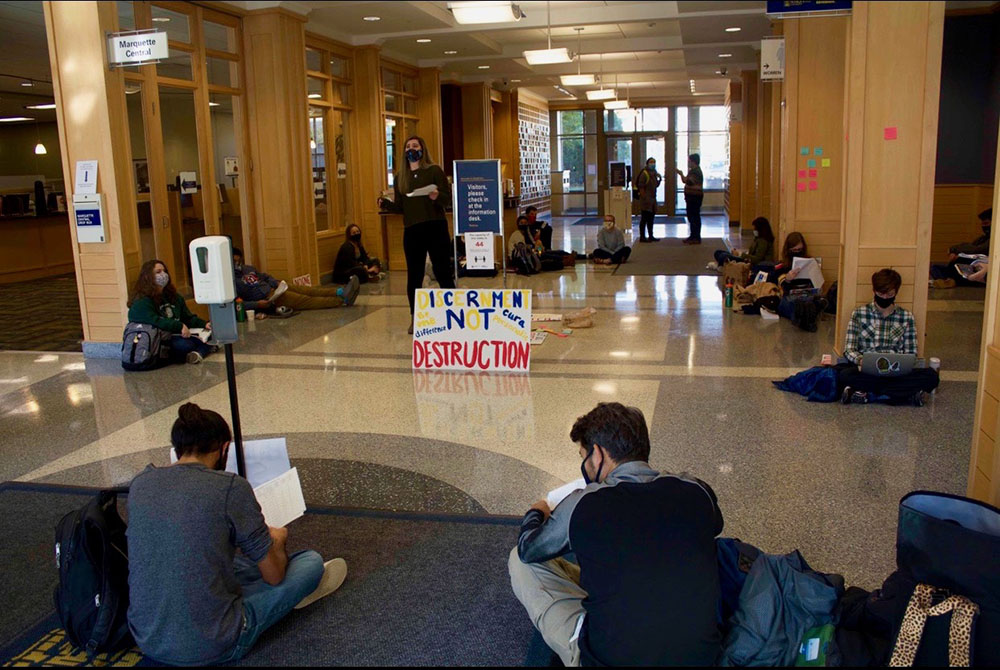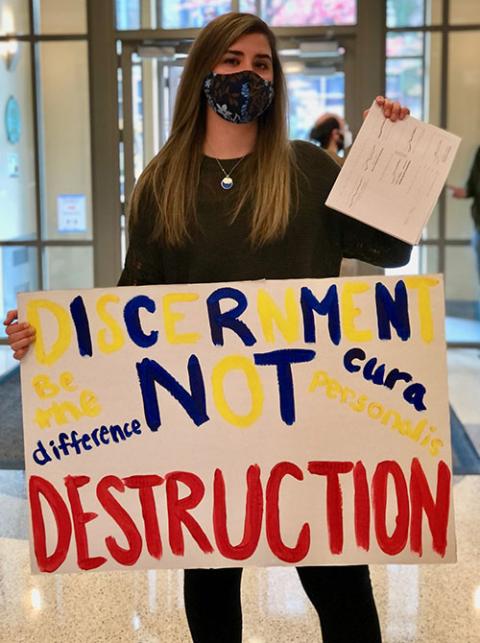
Signs adorn a car in an Oct. 18 alumni caravan protest against changes to the faculty handbook at John Carroll University in the Cleveland suburbs. (Courtesy of Kevin Henderson)
Layoffs and budget cuts are coming to Catholic campuses around the country as the financial impact of the pandemic begins to bite.
In many cases, administrators argue that the pandemic is merely prompting reforms necessary to deal with long-term challenges of rising costs and declining numbers of high school graduates.
But critics among faculty and students are up in arms over what they see as draconian decisions made without their input that jeopardize the universities' Catholic values.
That clash is nowhere more pronounced than at Marquette University in Milwaukee, where administrators are looking to close a $45 million shortfall with what the Milwaukee Journal Sentinel reports could be as many as 300 layoffs. Inside Higher Ed reported that according to faculty, these cuts could run up to 25% in some of the university's schools, such as the College of Arts and Sciences.
Michael Lovell, Marquette's first lay university president, told NCR that even before this year, prospective students and their parents were questioning the value of higher education, and Marquette had been preparing to adapt.
Then the pandemic arrived, and the university lost millions refunding room and board and waiving the on-campus housing requirement, according to Lovell. Marquette had to spend millions more on technology and testing, all while freezing tuition and watching freshmen enrollment drop 16%.

Marquette University President Michael Lovell, the Milwaukee Jesuit university’s first lay president, is working to cut the budget under pressure from the pandemic and long-term trends. (Courtesy of Marquette University)
"When the pandemic hit, it put a significant amount of stress on a system that was already in jeopardy," Lovell said. "Essentially the changes we were going to have to make got accelerated by the pandemic."
The university president stressed that no major cuts have been approved and that the administration is collaborating with six working groups that are principally composed of faculty members, and all include Jesuit representation.
"We're going to be a somewhat smaller university coming out of this," Lovell said before emphasizing that Marquette is committed to its Jesuit core and academic rigor.
But some faculty and students say that is exactly what the cuts will undermine.
Professors argue the cuts are deepest in the humanities and social sciences, as the university focuses on more career-oriented fields, and that those cuts will fall hardest on non-tenured faculty members who are more likely to be minorities. In turn, fewer faculty members will mean less research, fewer advanced courses and less individual attention for students.
"We're very quickly moving away from the Jesuit mission," Julia Paulk, an associate professor of Spanish, told NCR. "If we lose our identity as a Jesuit institution, we will look like a lot of other places that are more affordable."
Paulk and others said that Marquette did not exhaust other options before deciding on layoffs, and, instead of shrinking, the university should try to recruit a more diverse student body.
A common refrain from critics is that the administration has not been transparent in the process and failed to consult with faculty or students.
Many point to a student sit-in as case in point.

Students protest budget cuts during an Oct. 21 sit-in at Marquette’s main academic building. (Courtesy of Brooke McArdle)
Marquette senior Brooke McArdle organized the Oct. 21 demonstration during which students sat silently around the main floor of the administration building with signs denouncing the cuts. Administrators repeatedly told them to leave and requested their student IDs, but the students declined, McArdle told NCR.
McArdle was written up for failing to provide her ID and for a violation of the demonstration policy. Though her hearing drew another protest, McArdle was charged with the violations and has to write a seven-page paper on how to fix the demonstration policy.
The 21-year-old classical languages and history major has denounced what she sees as the university's financial mismanagement — she was handing out statistics on the university's administrative costs she obtained through public records requests during the sit-in — and said the punishment was arbitrary retaliation.
"I'm the student you're trying to create, and you're sanctioning me for being the difference," she said about her own development as a college student.

Brooke McArdle, a senior at Marquette University, is pictured during an Oct. 21 sit-in at the university’s administration building opposing deep budget cuts she says will harm the school’s mission and reputation. (Courtesy of Brooke McArdle)
Lovell and Provost Kimo Ah Yun pushed back on the students and professors' criticisms.
The president said he met with McArdle one-on-one for 40 minutes, took a pay cut himself and has held town halls since the beginning of the pandemic. The provost said he hosts frequent videoconference coffee chats with university community members, and meets regularly with the student government.
Last week the university's Jesuit community weighed in, emphasizing the university's Ignatian mission.
"Marquette is not a business; rather, it is an apostolate of the Society of Jesus," Jesuit Fr. Gregory O'Meara, rector of the university's Jesuit community, wrote in an open letter.
Marquette is not the only Catholic college setting off outcry over cuts.
Dozens of student groups and American Association of University Professors chapters at ten of the country's largest Jesuit universities condemned "the rash of austerity-driven layoffs, firings and program eliminations," at U.S. Jesuit schools in a Nov. 12 petition.
Vincentian Fr. Dennis Holtschneider, president of the Association of Catholic Colleges and Universities, told NCR that many schools dipped into endowments, deficit spent, and froze salaries and benefit payments, hoping things would return to normal this fall.
"Up until this moment there has not been wide-scale layoffs of employees, but that's beginning," Holtschneider said. "You're watching schools begin now to start announcing closures of whole academic programs and reduce part-time faculty to be sure, but even full-time faculty."
Catholic colleges need another round of federal stimulus to avoid more painful decisions, Holtschneider said.
Advertisement
At Canisius College cuts have already arrived. The Jesuit college in Buffalo nixed 96 positions, including 22* professors, and eliminated a half-dozen programs over the summer.
The national American Association of University Professors, or AAUP, announced an investigation into Canisius' layoffs in September, according to Tanya Loughead, a philosophy professor and president of the college's AAUP chapter. She said she knows of at least six former faculty who plan to sue the college over their terminations.
Canisius' administration says it acted appropriately.
Loughead said the dire predictions about cuts at other universities are coming true at Canisius. Many core courses previously taught by full-time professors are now taught by adjuncts, while other advanced classes have disappeared entirely, she said.
"You would be hard pressed to find another time in the recent history of Canisius College where there was so much distrust in our present administration and trustees," she said.
Across Lake Erie at John Carroll University in the Cleveland suburbs, professors and alumni are worried cuts are on their way.
During the summer the administration eliminated the art history department, cutting two tenured professors in the process. Now they have proposed amendments to the employee handbook to require "financial hardship" rather than "financial exigence" for layoffs of tenured faculty, a seemingly minor change that professors say could open the door to further terminations.
"These developments strike at a most basic level against tenure and the academic freedom it has protected for almost as long as universities in the United States have existed," John Carroll University's AAUP said in an open letter to the student newspaper.

Signs adorn a car in an Oct. 18 alumni caravan protest against changes to the faculty handbook at John Carroll University in the Cleveland suburbs. (Courtesy of Kevin Henderson)
In a statement to NCR, John Caroll's president, Michael Johnson, said the university must reduce costs by $15 million and that the handbook changes are intended to bring the university's policies in line with "best practices and current economic realities."
Johnson added that he has and continues to seek faculty input, and that the amendments will not go into effect until next year.
At John Carroll University, a group of engaged alumni and faculty have spearheaded the opposition to the changes, leading a week of action in mid-October.
Forty cars in a protest paraded around the university on Oct. 18, and alumni have been bombarding Johnson with emails, according to Kevin Henderson, a 2011 alumnus who has helped organized much of the alumni opposition to the elimination of the art history program, layoffs and handbook changes.
"These are their three big solutions out of the gate?" he told NCR. "That's absolutely an attack on the Catholic, Jesuit identity of the university. It's not caring for the most vulnerable or the whole person."
*This story has been updated to update the number of professors let go at Canisius College.
[Alexander Thompson is a freelance journalist covering K-12 Catholic education from Boston.]





